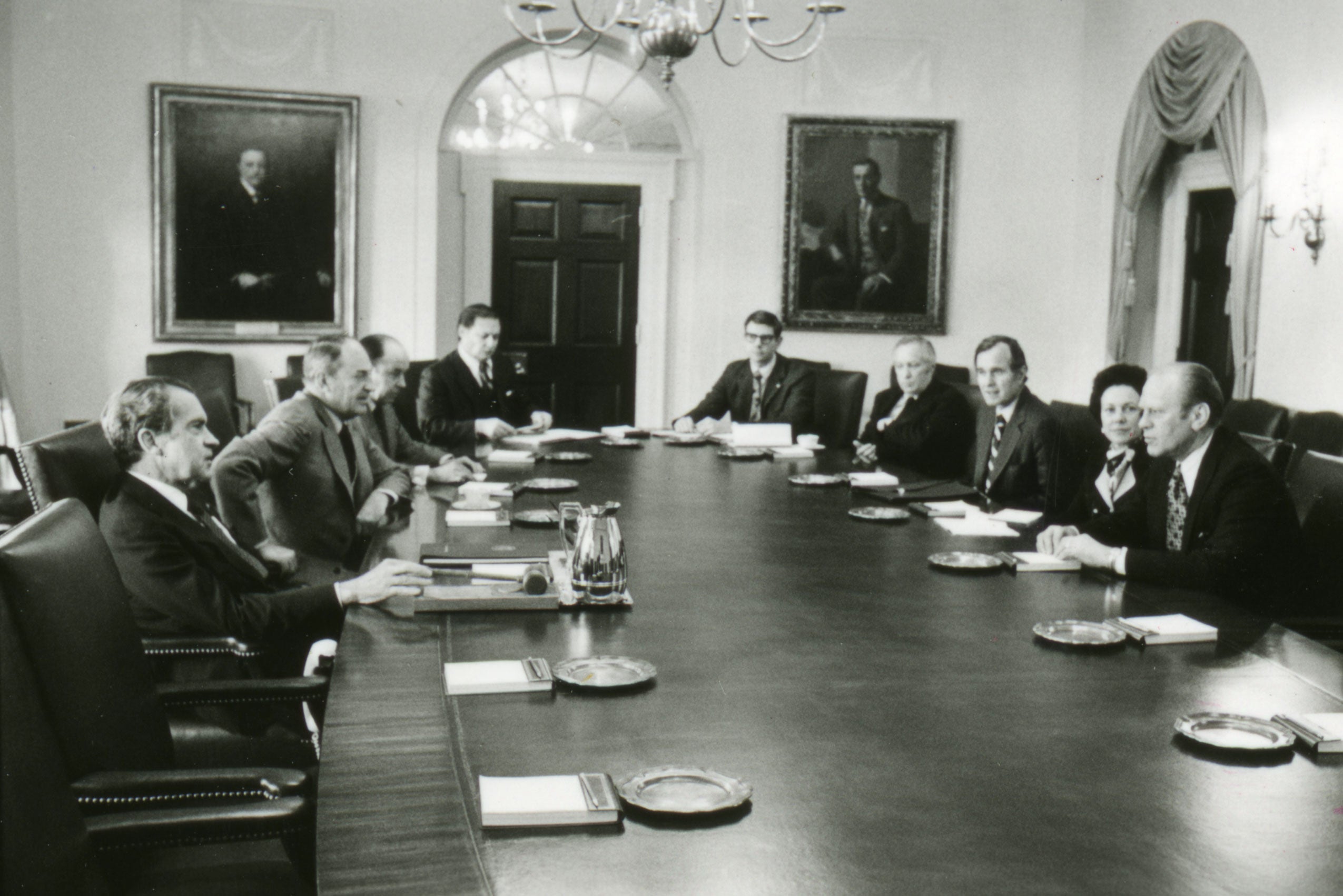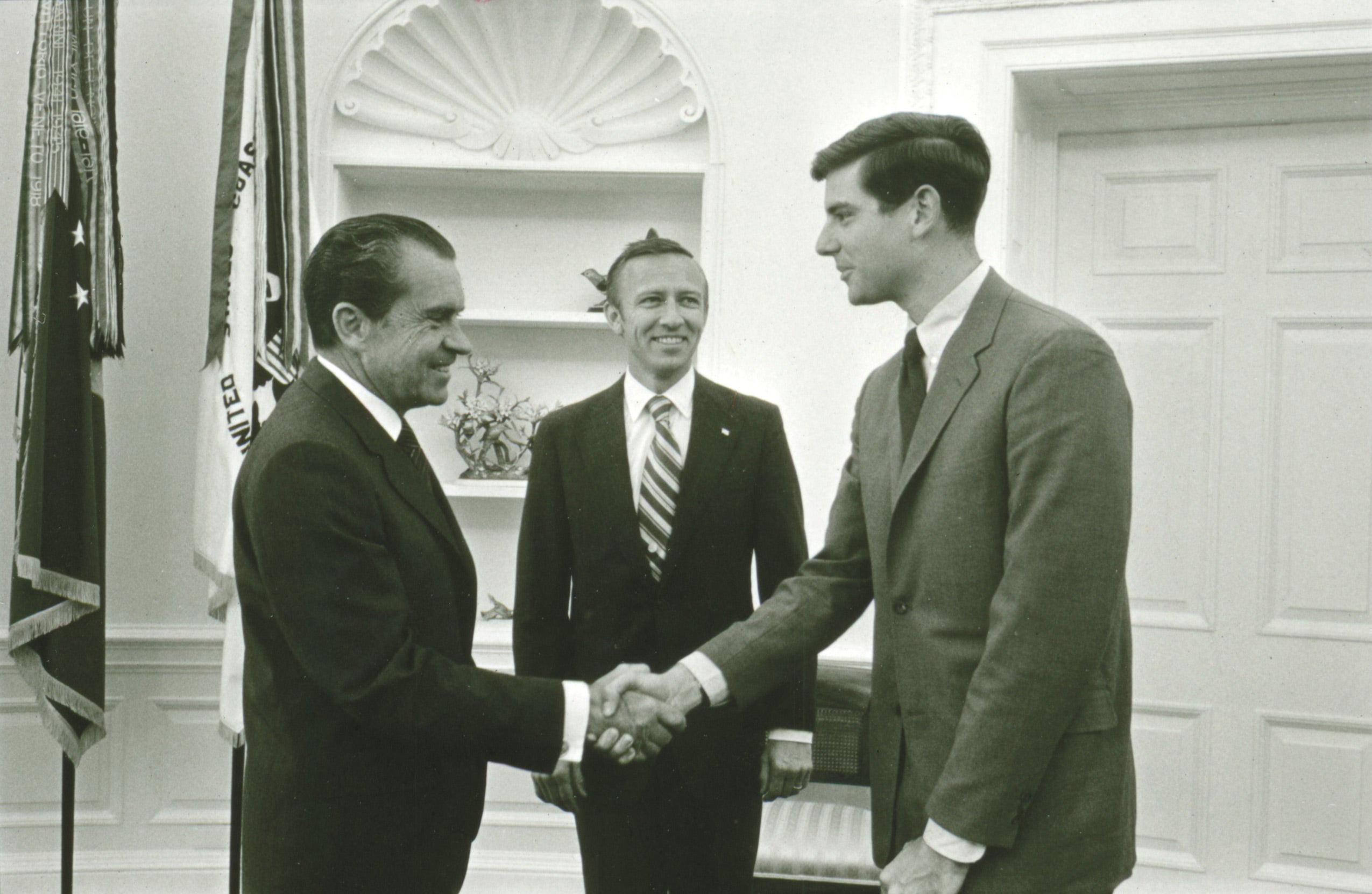When he was a student at HLS, a friend made Geoff Shepard ’69 a campaign button that said “Nixon Shepard,” representing Shepard’s enthusiasm for the presidential candidacy of Richard Nixon and his hope that he would join Nixon in the White House. Shepard still has the button today—and almost 50 years later is still advocating for the president he served and defended.
Earlier this year, he came back to the law school to present his findings from his recent book, “The Real Watergate Scandal: Collusion, Conspiracy, and the Plot That Brought Nixon Down.” Based on documents he uncovered from the Watergate proceedings housed in the National Archives, the book contends that charges of a cover-up that ultimately forced Nixon to resign from office proved unfounded. Even the “smoking gun” tape that appeared to show the president seeking to limit the FBI’s Watergate investigation was misunderstood, Shepard contends: It was in fact an attempt to keep the names of Democratic donors to the Nixon campaign from becoming public. Yet the cover-up charges were buttressed by biased prosecutors and judges who colluded to ensure the downfall of the president, he believes.
“Judges and prosecutors aren’t supposed to get together in advance and make decisions, and that’s what it turns out they were doing,” he said. “It’s just startling, what was going on.”
Shepard’s presentation at HLS was one of many he has made at law schools around the country, where he has found students interested in his examples of a flawed system of due process. For them, it’s history (Shepard jokes that the students buy the book for their parents). For him, it’s his life.
Like Nixon, Shepard went to Whittier College in California, where he grew up. In fact, to his surprise, he sat next to Nixon during a luncheon at the college which the former vice president at the time attended to present a scholarship to Shepard. He later was thrilled to find out that Nixon had doubled his scholarship amount—to $500.

When he was a law student, Shepard applied to be a White House fellow hoping to help the Nixon administration. It wasn’t, he said, because of a deep political conviction. He didn’t really even think about Nixon’s—or anyone else’s—politics at the time. Nixon gave him scholarship money and they went to the same college. And they had something else in common: “He wasn’t a highfalutin Easterner,” as Shepard put it, nor was either one among the “sons of prominent men” like those who were introduced by one of his professors during a first-year class at Harvard Law.
The “backward kid from Irvine Ranch,” as Shepard described himself, won the fellowship and the next year was hired for the staff of the White House Domestic Council under John Ehrlichman. Shepard would work with many of the major Watergate figures and, after the scandal broke, on the president’s defense team.
“To some extent, I think I’m a lone ranger, the sole survivor of a legal pogrom who cares about what happened, who is going to, by Jove, find some justice.”
It ended badly and he felt a share of responsibility, Shepard said. He stayed on with the Ford administration and then left government, never to return, working in the insurance industry for 35 years until his retirement. He has maintained connections from his White House experience through reunions he’s arranged with the policy planning staff and also helped produce “Nixon Legacy Forums,” documentaries on policy initiatives undertaken by the administration. Although for many people Nixon’s legacy can be summed up in one word, Shepard says the president he served should be celebrated for his foreign policy acumen and domestic achievements, such as efforts to combat drug abuse.
“The people who have loathed Richard Nixon—just this visceral hatred of this guy from nowhere, without culture, without family, without a Harvard education, who kept winning elections,” he said, “they want to give him no credit for anything.”
Shepard says his friends from that time have moved on from Watergate, but he won’t—even if many people think the case is settled history.
“To some extent, I think I’m a lone ranger, the sole survivor of a legal pogrom who cares about what happened, who is going to, by Jove, find some justice,” said Shepard. “The alternative view is Don Quixote tilting at historic windmills of no consequence whatsoever.”
He may yet discover which view is more accurate. He cites the possibility of a lawsuit, a coram nobis, to challenge the long-ago Watergate rulings and, perhaps, to use another literary metaphor, to finally catch his white whale.
